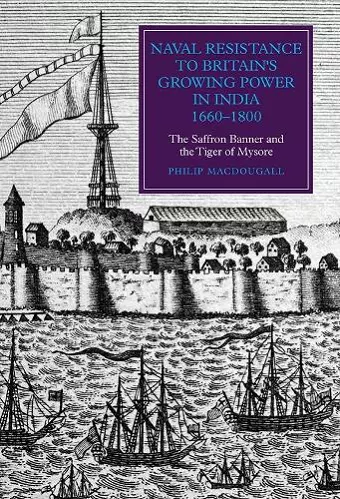Naval Resistance to Britain's Growing Power in India, 1660-1800
The Saffron Banner and the Tiger of Mysore
Format:Hardback
Publisher:Boydell & Brewer Ltd
Published:20th Nov '14
Currently unavailable, and unfortunately no date known when it will be back

Reveals, from a non-Eurocentric perspective, how Indian states developed and implemented maritime strategies which posed a serious threat to British naval power in the region. Most books on the colonisation of India view the subject in Eurocentric imperial terms, focusing on the ways in which European powers competed with each other on land and at sea and defeated Indian states on land, and viewing Indian states as having little interest in naval matters. This book, in contrast, reveals that there was substantial naval activity on the part of some Indian states and that this activity represented a serious threat to Britain's naval power. Considering the subject from an Indian point of view, the book discusses the naval activities of the Mahratta Confederacy and later those of Mysore under its energetic rulers Haidar Ali and his successor Tipu Sultan. Itshows how these states chose deliberately to develop a naval strategy, seeing this as the most effective way of expelling the British from India; how their strategies learned from European maritime technology, successfully blending this with Indian technology; how their opposition to British naval power was at its most effective when they allied themselves with the other European naval powers in the region - France, Portugal and the Netherlands, whose maritime activities in the region are fully outlined and assessed; and how ultimately the Indian states' naval strategies failed. Philip MacDougall, a former lecturer in economic history at the University of Kent, is a founder member of the Navy Dockyards Society, editor of the Society's Transactions, and the author or editor of seven books in maritime history, including The Naval Mutinies of 1797 (The Boydell Press, 2011).
A broad history of IndoEuropean maritime conflicts that is accessibly written and enjoyable. Additionally, he uses his background in maritime history to make valuable observations on the ships, strategies, and naval facilities of various Indian powers. * INTERNATIONAL JOURNAL OF MARITIME HISTORY *
This is an excellent study of a neglected but important aspect of Anglo-Indian history, and comes highly recommended. * WWW.HISTORYOFWAR.ORG *
Historians outside MacDougall's geographic specialization would do well to take notice of this recent historiographical contribution. Maritime, military, and global historians as well as historians of technology and indigenous peoples will all find valuable examples to enrich their own comparative analyses. * H-NET Reviews *
ISBN: 9781843839484
Dimensions: unknown
Weight: 502g
222 pages